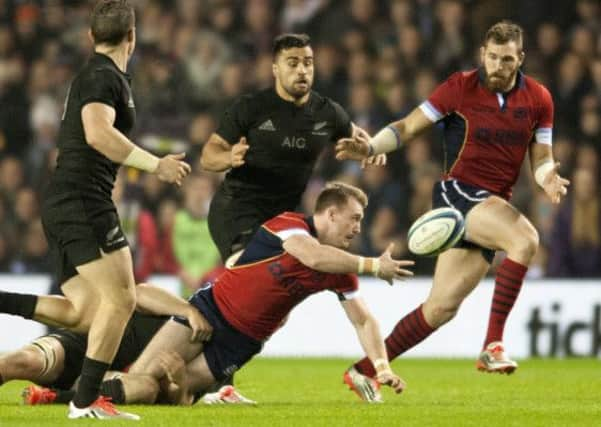Scots rue a missed opportunity against New Zealand


And they know it, too, hence the mixture of disappointment and frustration they showed at the end of the game. Previous Scotland sides have come off the pitch at the end of an All Blacks Test exhibiting bewilderment at the battering they have just taken, or sheer relief that the whole thing has ended. It is a measure of how much and how quickly this squad have improved that they were able instead to reflect ruefully not on the traditional gulf between the teams but on the narrowness of the defeat.
Much had been made before this second viagogo Autumn Test of the experimental nature of the New Zealand team, who had 13 changes from the one that began the previous week’s win at Twickenham. But it is important to remember that the Scotland squad, too, was hardly composed of grizzled veterans.
Advertisement
Hide AdAdvertisement
Hide AdTrue, this was close to Vern Cotter’s ideal starting XV, while All Blacks coach Steve Hansen might regard no more than a handful of his beginning line-up as regular first choices. Even so, going into the game, ten of the Scotland squad had a caps total in single figures, which made this near thing all the more commendable.
It was the closest loss to the All Blacks since the third-place play-off at the 1991 World Cup – and it could have been closer still had Greig Laidlaw been on target with a penalty ten minutes from time. That kick would have given Scotland a 19-17 lead, and when it drifted to the right of the posts, memories were inevitably evoked of Peter Dods’ late conversion miss in the 1983 draw.
With so much time remaining, no canny gambler would have bet against the All Blacks regaining the lead – and, of course, they would only have needed a drop goal or penalty to do so – but it would, at the very least, have been interesting to see how they responded to the extra pressure.
In the end, Jeremy Thrush’s converted try stretched the winning margin from one point to eight and meant that Laidlaw’s miss did not quite take on the historic significance of Dods’.
Nonetheless, that one kick, while far from the only error in the game, was emblematic of an afternoon in which Scotland came so close to achieving something special.